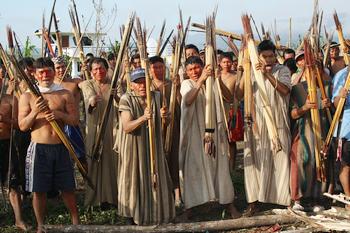在祕魯亞馬遜雨林的原住民族群以阻斷交通要道和水道、以及關閉汲油站的油管等超過6星期的抗爭後,秘魯政府開始採取鎮壓措施。

攝影:David Dudenhoefer
過去兩週,秘魯總統賈西亞(Alan Garcia)宣佈亞馬遜省份進入緊急狀況,下令允許軍方協助國家警察維持當地秩序,並以危害國家的罪名逮捕抗議群的領導者。
這幾週的抗爭活動在「秘魯雨林族群發展協會」(Peruvian Rainforest Inter - Ethnic Development Association,AIDESEP)的規劃下,共計超過1萬人參與,其中有許多人畫上戰紋、攜帶弓箭。AIDESEP是代表祕魯大部分共約50個亞馬遜在地族群的聯盟組織。
AIDESEP的領導者要求政府撤除2008年發布的9個法令,他們表示這些法令將會加速森林砍伐以及部落土地與自然資源的私有化。
AIDESEP所反對的法令之一,是總統賈西亞在2008年為了承諾與美國的自由貿易協議所簽訂的,共計超過100條法規。過去兩週,許多祕魯行政首長聲稱,撤除這些法規將會危害自由貿易協議,其影響在2009年初已浮現。
但是根據國會安地斯與亞馬遜原民委員會(Congressional Commission of Andean and Amazonian Peoples)主席納哈(Roger Najar)表示,這些充滿疑議的法條和自由貿易協議並不相干,而只不過是賈西亞政府為了開放亞馬遜區域以作為更大範圍的外國投資所訂的階段程序的其中之一。

攝影:David Dudenhoefer
目前的爭議源於1個月前、距在地族群抗爭兩個星期時,那時AIDESEP的領導者們與國會議長暨賈西亞政府參謀長Yehude Simon承諾合作,如今已協商破裂。
賈西亞一直忽視抗爭活動,使其內閣官員與首長繼續護持這些法律。而在2009年5月16日,他公開發表對於AIDESEP領導者遭逮捕的感嘆,並表示「亞馬遜土地是屬於整個國家的資產,並不屬於住在那裏的一個小群體」。
然而,秘魯東部已約有16%的亞馬遜雨林遭出租開採資源,這些是雨林中生物多樣性最豐富的區域,也是50多個族群共超過35萬在地居民的家園。
佔據機場跑道和石油公司貨船的Ashanika部落抗議者表示,賈西亞不瞭解也沒有興趣了解他們的看法,並抱怨他們村莊遭出租作伐木用途,以及石油公司造成水源污染,2007年12月尤魯邊巴河(Urubamba River)大量魚群死亡事件就是一例。
After more than six weeks of protests by Peru's Amazonian indigenous groups that have included blockades of major roads and waterways and the shutting down an oil pipeline pumping station, the Peruvian government has begun to crack down.
During the past two weeks, the administration of President Alan Garcia has declared a state of emergency in the country's Amazon provinces, issued a decree allowing the military to help the national police maintain order there, and charged the protest's leaders with crimes against the state.
The protests, which have involved more than 10,000 men, many of them in war paint and armed with bows and arrows, are being coordinated by the Peruvian Rainforest Inter-Ethnic Development Association, AIDESEP, an umbrella group that represents most of the country's approximately 50 Amazonian indigenous ethnicities.
AIDESEP's leaders are demanding the repeal of nine legislative decrees issued last year that they claim will facilitate the deforestation and privatization of their traditional lands and natural resources.
The laws that AIDESEP objects to were part of a package of more than 100 decrees that President Garcia signed last year in order to get Peru into compliance with a Free Trade Agreement that the country made with the United States. During the past week, various of the country's ministers have warned that repealing those decrees could endanger the Free Trade Agreement, which went into effect early this year.
But according to Congressman Roger Najar, the president of the Congressional Commission of Andean and Amazonian Peoples, the decrees in question have nothing to do with the Free Trade Agreement. He claims that they are simply part of the Garcia administration's agenda to open the country's Amazon region up to large-scale foreign investment.
The current conflict seemed headed for resolution a month ago, after just two weeks of indigenous protests,when AIDESEP's leaders gained promises of cooperation from the President of the Congress and Garcia's Chief of Staff Yehude Simon (ENS April 23, 2009), but those negotiations soon broke down.
President Garcia has largely ignored the protesters, leaving it to his chief of staff and ministers to defend the decrees. However, in a public event on May 16, he lamented the position of AIDESEP's leaders and reminded the audience that, "The Amazonian lands belong to the entire nation, not to a small group that lives there."
Eastern Peru comprises about 16 percent of the Amazon rainforest , one of its most biologically diverse regions , and is home to more than 350,000 indigenous people from some 50 ethnic groups.
Protesters from the Ashanika tribe who occupied an airstrip and took over oil company boats near the Amazonian town of Atalaya claimed that Garcia neither understands, nor is interested in their views. They complained about logging concessions near their villages and water pollution caused by oil companies, citing a major fish kill on the Urubamba River in December of 2007.




